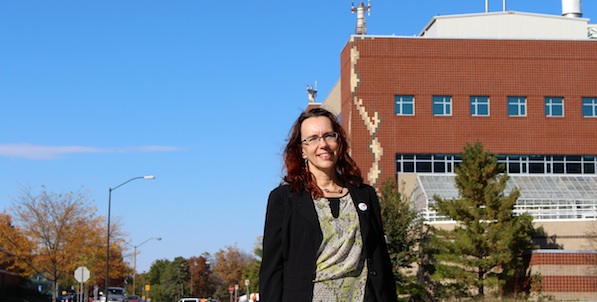
Building Trust, Talking Science
Marcella Szymanski is on the front lines of the global trade war surrounding genetic engineering. To her, it’s really more of a trade wreck.
When we’re dealing with genetic engineering we’re dealing with a regulated technology. Some countries regulate this technology differently than we do,” Szymanski says.
Szymanski (’97 PhD forestry), deputy director for agricultural policy for the U.S. Department of State, works in the Agricultural Policy Office in the Bureau of Economic and Business Affairs.
“The U.S. considers regulation on a product-by-product basis, the European Union regulates by technique. This tends to produce trade wrecks, rather than trade wars. Trade wars occur when a country tries to keep a product out because they say their consumers don’t want it. Think poultry chlorine washes or hormones in beef. With those we have a trade war. But with biotech, we have had, such as in Europe, trade wrecks,” Szymanski says.
Szymanski is responsible for developing and implementing U.S. trade policy related to new agricultural technologies and working with foreign governments to address regulatory barriers to U.S. agricultural exports. She also works closely with officials from developing countries to support the development of biosafety legislation and facilitate technology transfer to increase agricultural productivity.
“We are not going to feed the world on organic or non-input agriculture,” she says. “We need 60 percent more food by 2050 using less land, water, fertilizer and pesticides. To do this we need science. We need to find the solution in agriculture.”
One potential solution is genetic engineering, a biotechnology tool used to speed up the results of conventional breeding. Genetic engineering uses modern molecular biology to transfer well-characterized genes into a plant resulting in a genetically modified organism (GMO). The alterations are made to achieve a desired trait such as drought resistance or improved nutritional value. The technical precision and knowledge of manipulated genetic information makes the risks of this type of gene transfer comparable to or less than classical breeding, according to the American Society of Plant Biologists.
How did a technique used by plant breeding scientists get so polarized?
Science is moving beyond the speed people are comfortable with, says Szymanski. “To calculate old-school risk we used to multiply the hazard times exposure. Now, thanks to the ‘tweetification’ of risk, the new school of risk is calculated by multiplying the hazard times media exposure. The result is the perception of risk. Perception drives policy. You can’t tweet common sense. But, as scientists we can provide links to resources,” she says.
To connect with consumers, Szymanski encourages scientists to do four things before getting to the science: Personalize the story. Acknowledge concerns. Connect. Build trust.
Szymanski has been building trust her entire career.
She was introduced to policy work when she accepted a science and technology policy fellowship with the American Association for the Advancement of Science in 2004.
While on fellowship to the U.S. Department of State, she served as a desk officer advising on science and technology issues for Pakistan. Szymanski says after 9/11, strengthening a long-term U.S.- Pakistan relationship became a priority. Her efforts to bring together scientists, educators and officials in collaborative talks helped improve non- military cooperation with Pakistan. They formed 16 joint working groups and more than 30 joint science projects were funded. Fulbright exchanges also were expanded and groundwork laid for private sector partnerships and vocational training.
She joined the State Department in 2005 and two years later had the opportunity to step up and play an integral role in diplomacy at a crucial time in Bangladesh’s history.
“Bangladesh had one foot in a coup and one foot in a democracy. I acted as the desk officer several times and as an interlocutor with Bangladesh Foreign Service officials,” she says. “I prepared and presented analyses to senior U.S. officials on developing a road map toward democracy, monitored a rapidly changing political situation and met with human rights and other interested nongovernmental organizations.”
Prior to joining the State Department, Szymanski taught and worked in agricultural extension with the University of Kentucky. She received her master’s in forest genetics from Oklahoma State and her bachelor’s in forestry from the University of Georgia. She has worked with rural farmers in the United States and abroad as a Peace Corps Volunteer in Maragoli, Kenya.
Szymanski continues to encourage scientists to lead the discussion about GMOs and other agricultural biotechnologies as they are key tools in meeting the global food challenges of tomorrow.
“I believe technology will help us meet these challenges. A great example is in 2013 the World Food Prize awarded three distinguished scientists—Marc Van Montagu, of Belgium, and Mary- Dell Chilton and Robert T. Fraley of the United States—for their independent, individual breakthroughs in founding, developing and applying modern agricultural biotechnology.”



